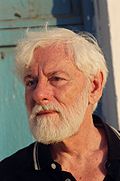DURING THESE two weeks, Israeli society showed itself in the worst possible light -- as an armed ghetto, devoid of compassion for others and incapable of rational thinking.
True, the first reaction was not uniform. I have heard several people in the street cursing the three missing young settlers for their stupid arrogance, standing in the dark of the night in the middle of the occupied territory and climbing into a strange car. But such impious sentiments were soon washed away by a huge wave of brainwashing, which was well-nigh inescapable.
It is a universal trend for peoples to unite in a national emergency. In Israel, this is amplified by the ghetto reflex, formed by centuries of persecution, for Jews to stand together against the evil goyim.
The deluge of government propaganda assumed incredible proportions. Almost the entire coverage in the newspapers was devoted to the military operations. Radio and TV extended this coverage live around the clock, 24 hours daily, day after day.
The journalistic establishment was led by the "military correspondents," almost all of them former army intelligence officers, who were acting as agents for the army spokesman, reciting army communiques as though they were their own disclosures and insights. No difference between the various stations and newspapers could be detected. If some liberal commentator dared to voice a word of criticism, it was very muted and concerned only minor details.
BY CHANCE, at the same time a bill was making its way in the Knesset. It would make any prisoner exchange illegal -- a rare case of a government handcuffing itself. It forbade the government giving amnesty to "security prisoners" or negotiating prisoner exchanges.
This means death to hostages.
In their incredible naivety -- not to say stupidity -- right-wing politicians believed that this would deter hostage-taking. Anyone with even a slight comprehension of militant mentality knows that the effect would be the very opposite: take more hostages, increase the pressure to free prisoners.
The lives of hostages would become very cheap indeed. The present endeavor of the intelligence agencies and the army to discover the whereabouts of the three absentees, if successful, would lead to an action to free them by force. As experience shows, in such a situation, the chances of the hostages surviving are slim. Caught in the crossfire, they are killed either by their captors or -- more frequently -- by their liberators. Yet not a single voice in Israel raised this crucial point.
The Shalit family, ordinary secular Israelis, were acutely aware of this danger to their son. Not so the families of the three missing settler-boys, all of them settlers belonging to the extreme Right. They have become willing agents of government propaganda, calling for mass prayers and support for the settler movement. Their rabbi explained that the capture of the youngsters was God's punishment for recent efforts to compel religious youths to serve in the army.
THE GOVERNMENT is obviously far more interested in a political propaganda victory than in securing the release of the hostages.
The main aim is to pressure Mahmoud Abbas to abandon the inter-Palestinian reconciliation and to destroy the new experts-only Palestinian government. Abbas resists. He is already widely denounced in Palestine, because of the ongoing close cooperation between his security forces and the Israeli ones, even while the Israeli operation is continuing. Abbas is playing a very dangerous game, trying to balance all the pressures. Whatever one's political opinion, his courage cannot be denied.
The Israeli leadership, living in its bubble, is totally unable to understand world reaction, or the lack of it.
Before it all started, the number of Palestinians, including children, killed by live fire during demonstrations had steadily increased. Apparently, the rules of engagement, as understood by the soldiers, have made this easier. Since the present operation started, more than five non-combatant Palestinians have been killed by the army, some of them children.
In the Israeli edition of the New York Times, a large part of the front page was taken up by the picture of a Palestinian mother grieving for her child, not by the hostages.
But when the three mothers, who were sent for propaganda purposes to the UN human rights commission in Geneva, were accorded a chilly reception, the Israeli government was astonished. Delegates were more interested in human rights violations by Israel than in the hostages -- for many Israelis another glaring example of the anti-Semitism of the UN.
(Note: You can view every article as one long page if you sign up as an Advocate Member, or higher).





